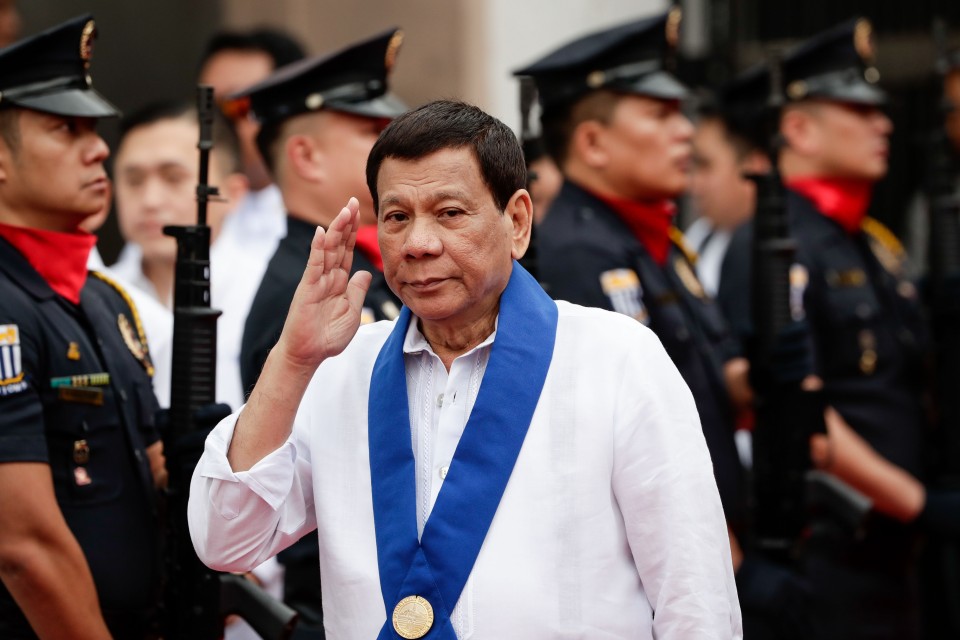Richard Javad Heydarian is an author focused on Asian geopolitics. He previously taught political science at De La Salle University and Ateneo De Manila University and served as a policy advisor at the Philippine House of Representatives.
MANILA, Philippines — In what could be the beginning of the trial of the century, the International Criminal Court has initiated a preliminary probe into alleged extrajudicial killings in the Philippines.
The prime target is no less than President Rodrigo Duterte, who has overseen a bloody campaign against suspected drug dealers since his ascent to power in 2016. Almost overnight, the Southeast Asian country transformed from a “bastion of human rights and democracy” into potentially the latest member of an exclusive club of nations that have seen their leaders prosecuted for crimes against humanity. In response, Duterte has called to withdraw his country’s membership to the international body, which would make the Philippines only the second nation, after Burundi, to withdraw.
Duterte’s rise — his mind-boggling popularity and curious mélange of rhetorical overdrive and policy equivocation — can’t be understood in isolation. It has to be situated within a broader context of how populism takes root in rapidly modernizing nations like the Philippines, because Duterte is, first and foremost, a populist; he uses, to quote one political researcher, a “political style that features an appeal to ‘the people’ versus ‘the elite’, bad manners, and the performance of crisis, breakdown or threat.”
Lessons from history
Reflecting on his country’s transmogrification in the opening decades of the 20th century, the Italian Marxist thinker Antonio Gramsci lamented how “the old [order] is dying and the new cannot be born,” warning how “in this interregnum, a great variety of morbid symptoms [begin to] appear.”
With the liberal bourgeoisie discredited, Italian socialists and fascists fought for the soul of the nation throughout the first half of the century. As Gramsci observed in his home country, “incurable structural contradictions have revealed themselves … and that, despite this, the political forces … are struggling to conserve and defend the existing structure.”
The result was a political deadlock, which paved the way for the rise of the most pernicious perversion of populism: fascism. Almost exactly a century later, Gramsci’s portrayal of his country eerily resembles the zeitgeist among many troubled emerging (and mature) democracies in the opening years of the 21st century.
Recent years have seen the liberal elite suffering one electoral setback after another around the world, as strongman-populists dislodge the establishment in favor of a new brand of politics that seems both familiar and new. The specter of what American pundit Fareed Zakaria calls “illiberal democracy” is haunting the democratic world, as a distinct process of what I call “authoritarianization” puts into question the durability of democratic values in one nation after the other.
Democracy fatigue
This is particularly true among the members of what American political scientist Samuel Huntington termed the “third democratic wave,” which swept across the developing and post-Soviet world over the past four decades. What we see today is the emergence of hybrid regimes that combine elements of electoral democracy with autocratic governance.
Often the culprit behind democratic decay and degenerative mutation is the absence of functioning state institutions that have the capacity to discipline rapacious elites, enforce laws and insulate the bureaucracy from the undue influence of interest groups. As a result, we are beginning to experience a troubling phenomenon — a “democratic fatigue” — as a growing share of citizens, including in developed societies, becomes comfortable with the notion of military rule or full autocratic takeover.
The zeitgeist of democratic decay and democracy fatigue — namely, the deepening public dissatisfaction with business-as-usual practices of the (democratic) political elite — is most acutely apparent among Asia’s oldest democracies, such as the Philippines. At the heart of this great transformation stands Rodrigo Duterte, the tough-talking mayor-turned-president who has single-handedly transformed the Philippines’ domestic and foreign policy trajectory unlike any of his predecessors.
Emerging market populism
The rise of populists like Duterte is part of an arc of populism that has inundated major emerging market democracies, where, unlike in the West, immigration and economic decline aren’t issues. Instead, the appeal of populists and strongmen in these countries lies in their uncanny ability to tap into collective frustrations — most especially among aspirational middle classes — over the inefficacy of state institutions to accommodate new voices and provide basic goods and services.
The widening divide between exponentially rising social expectations and glacially advancing state capacity provides a perfect gap for populists to seize power based on a promise of overnight salvation. The ultimate sacrificial lamb, however, is the liberal constitutional order among fledgling democracies. We’ve seen this everywhere from India with Prime Minister Narendra Modi to Turkey with President Recep Tayyip Erdogan and Indonesia with popular presidential candidate Prabowo Subianto.
Stylistically, as a president, and substantively, as the former mayor of Davao, Duterte is a hands-on, macho leader who has little appreciation for institutional checks and balances. Yet his attempt to replicate his “Davao model” on the national scale has been far from successful and is fraught with risks of unintended consequences for his administration and the well-being of the Philippines. His signature “war on drugs” campaign has — even by his own admission — fallen short of its objectives, while triggering domestic and international backlash.
The Southeast Asian country, like Gramsci’s Italy, is caught in an interregnum, struggling to anchor itself somewhere between strong-man populism, autocratic nostalgia and democratic resistance — with no clear resolution on the horizon. The Philippines has entered a twilight zone.
This op-ed — partially adapted from the author’s latest book, “The Rise of Duterte: A Populist Revolt Against Elite Democracy” — was produced by The WorldPost, a partnership of the Berggruen Institute and The Washington Post.





